Inadequate Staff Training and Nursing Home Falls
Abuse and Neglect, Nursing Home AbuseWhen we place our loved ones in the care of a nursing home, we trust the facility will ensure their safety and well-being. However, when staff members receive inadequate training, the risk of a devastating fall rises dramatically. The link between inadequate staff training and nursing home falls is undeniable.
These incidents can result in severe injuries, prolonged suffering, and significant emotional and financial burdens for both residents and their families. If this has happened to one of your family members, a nursing home abuse lawyer will work tirelessly to hold the facility accountable and seek the money you deserve.
Training Requirements for Certified Nursing Home Staff
The quality of care in nursing homes depends on the training and certification of the staff who provide direct care to residents. Proper training ensures that staff members have the knowledge and skills necessary to meet the complex needs of elderly and disabled residents.
This training is particularly crucial for Certified Nursing Assistants (CNAs) and other direct care staff, who play a vital role in the day-to-day care of nursing home residents. The federal government mandates CNAs to undergo a minimum of 75 hours of training, which includes at least 16 hours of supervised clinical training.
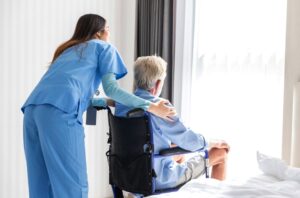
CNA training programs typically include topics such as:
- Basic nursing skills: CNAs learn fundamental nursing skills such as taking vital signs, assisting with mobility, and providing personal hygiene care.
- Communication skills: CNAs are trained in effective communication techniques to interact with residents, families, and other healthcare team members.
- Resident rights: Understanding and respecting residents’ rights is a key component of CNA training.
- Emergency procedures: CNAs must also know how to respond to emergencies, including falls, cardiac arrest, and other critical situations.
Other Direct Care Staff
In addition to CNAs, other direct care staff in nursing homes also have specific training requirements. These include Licensed Practical Nurses (LPNs), Registered Nurses (RNs), and various types of therapists (e.g., physical, occupational, and speech therapists).
- Licensed Practical Nurses (LPNs): LPNs typically complete a year-long state-approved nursing program that includes coursework and clinical practice. To become licensed, they must pass the National Council Licensure Examination for Practical Nurses (NCLEX-PN).
- Registered Nurses (RNs): RNs usually hold an associate or bachelor’s degree in nursing and must pass the National Council Licensure Examination for Registered Nurses (NCLEX-RN). They receive extensive training in patient care, medical procedures, and critical thinking.
- Therapists: Therapists in nursing homes must have specialized education and certification in their respective fields. They must also complete accredited programs and pass national certification exams.
Ongoing Education
Continuing education is essential for all nursing home staff to stay current with best practices and advancements in healthcare. Most states require CNAs, LPNs, and RNs to complete a certain number of continuing education hours annually to maintain their certification and licensure.
Types of Specialized Training Staff Members Should Receive to Reduce Fall Risk
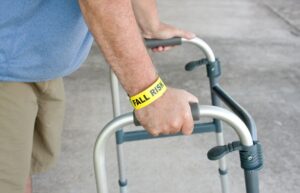
Nursing home staff must receive specialized training beyond the basic requirements to minimize fall risks. This specialized training includes behavioral management, dementia care, and feeding assistance, all of which play a significant role in ensuring resident safety and well-being.
Behavioral Management Training
A surprisingly large percentage of nursing home residents suffer from behavioral health disorders. Behavioral management training is crucial for staff to effectively handle the diverse and often complex behaviors nursing home residents exhibit. This training focuses on understanding and managing behaviors that may increase fall risks, such as agitation, wandering, and resistance to help. Key components include:
- De-escalation techniques: Staff learn strategies to calm agitated residents, reducing the likelihood of falls caused by sudden movements or resistance.
- Behavioral interventions: Training includes methods to identify triggers and implement interventions that promote safe behaviors.
- Communication skills: Effective communication helps staff members understand residents’ needs and prevent behaviors that can lead to falls.
Dementia Care Training
Dementia care training is essential for staff working with residents who have cognitive impairments. Residents with dementia are particularly vulnerable to falls due to memory issues, disorientation, and impaired judgment. This specialized training covers:
- Understanding dementia: Staff receive training on the different types of dementia, their symptoms, and how these can affect mobility and safety.
- Safe environment practices: Training emphasizes creating a safe and supportive environment tailored to dementia patients’ needs, such as clear pathways and appropriate lighting.
- Personalized care plans: Staff learn to develop and implement individualized care plans that address the unique fall risks associated with each resident’s cognitive condition.
Feeding Assistance Training
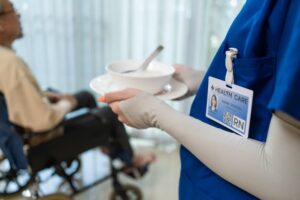
Proper feeding assistance is another critical area that can impact fall risk. Malnutrition and dehydration can weaken residents, making them more prone to falls. Specialized feeding training includes:
- Safe feeding techniques: Staff are trained in safe feeding techniques to prevent choking and ensure residents receive adequate nutrition.
- Monitoring intake: Training includes methods for accurately monitoring residents’ food and fluid intake to promptly identify and address nutritional deficiencies.
- Adaptive equipment: Staff learn to use adaptive feeding equipment designed to help residents eat and drink more safely and independently.
Integrated Fall Prevention Programs
In addition to these specialized training areas, staff should be part of comprehensive fall prevention programs that integrate knowledge from behavioral management, dementia care, and feeding assistance. Such programs typically involve:
- Regular assessments: Conducting frequent fall risk assessments to identify and mitigate potential hazards.
- Multidisciplinary approach: Collaborating with physical therapists, occupational therapists, and other healthcare professionals to create holistic care plans.
- Continuous education: Ongoing training sessions to keep staff updated on the latest fall prevention strategies and best practices.
Why a Lack of Training Contributes to Falls
Inadequate staff training and nursing home falls go hand in hand. These falls aren’t merely accidents; they often occur due to systemic issues, with poor training being a primary contributing factor. When any of the following lead to a fall, a nursing home abuse lawyer can help a victim and their family members seek justice.
Insufficient Knowledge of Fall Prevention
A well-trained staff knows various ways to prevent falls. These strategies include understanding the importance of maintaining clear pathways, ensuring proper lighting, and recognizing hazards that can lead to trips or slips. When staff members don’t have proper training, they may overlook these critical aspects of the environment, inadvertently creating conditions where falls are more likely to occur.
Inadequate Assessment Skills
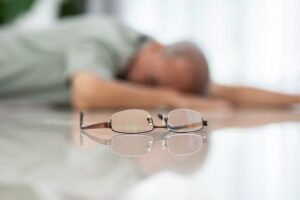
Good training involves teaching staff how to conduct thorough fall risk assessments. These assessments identify residents with a higher risk of falling and require specific interventions to prevent accidents.
Without this training, staff may fail to recognize the warning signs of a potential fall, such as a resident’s unsteady gait or a history of previous falls. Consequently, they may not implement necessary precautions, increasing the likelihood of an incident.
Poor Handling and Mobility Assistance
Helping residents with mobility is fundamental to caregiving in nursing homes. Staff members who lack training in safe handling techniques are more likely to make errors that can lead to falls.
For instance, improper use of transfer equipment, incorrect lifting methods, or inadequate support during ambulation can cause residents to lose their balance and fall. Comprehensive training ensures that staff are proficient in these techniques, reducing the risk of injury.
Lack of Emergency Response Preparedness
The immediate response to a fall can significantly impact the resident’s outcome. Training in emergency response procedures ensures that staff know how to act swiftly and effectively, providing the necessary assistance and medical care. Without this training, delays or inappropriate actions can worsen injuries and lead to further complications.
The Legal Ramifications of Inadequate Training
The link between inadequate training and nursing home falls has severe implications not only for the safety and well-being of residents but also legally. Nursing homes must adhere to specific training standards, and failure to do so can result in significant legal consequences.
An Overview of Legal Standards for Staff Training
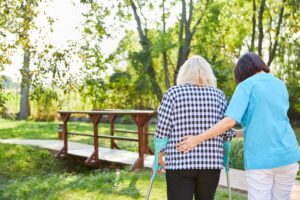
Federal and state laws mandate specific training requirements for nursing home staff. The federal Nursing Home Reform Act, part of the Omnibus Budget Reconciliation Act of 1987 (OBRA 87), sets forth minimum training standards for nursing home staff. States often have their own regulations, which may be more stringent. Governments design these regulations to prepare staff to provide high-quality care and prevent harm to residents.
Potential Lawsuits and Legal Actions
When a nursing home fails to meet these training standards, and this failure leads to harm, such as falls, a nursing home abuse lawyer can hold the facility responsible. Potential lawsuits may include claims of negligence, wrongful death, or violations of residents’ rights under state and federal laws. Families of affected residents can seek compensation for medical expenses, pain and suffering, and other related costs.
How Attorneys Gather Evidence and Build a Case
Nursing home abuse lawyers play a crucial role in holding facilities accountable for inadequate training. Build a solid strong case involves several steps:
- Investigation: Attorneys start by thoroughly investigating the incident. This investigation includes reviewing the facility’s training protocols and records, incident reports, and the victim’s medical records.
- Documentation: A nursing home lawyer will work to gather documentation of the training or the lack thereof that staff members received. Your attorney can obtain records of training sessions, attendance logs, and any certifications or qualifications of the staff involved.
- Interviews: Interviewing witnesses, including staff members, residents, and their families, helps gather firsthand accounts of the care provided and the conditions leading to the incident.
The Importance of Expert Testimony in Establishing Training Inadequacies
Expert testimony is often pivotal in cases involving inadequate training. Experts in nursing home care and staff training can provide valuable insights into the standards that should have been met and how the facility’s failure to meet these standards contributed to the resident’s harm. They can:
- Clarify standards: Explain the relevant training standards and regulations that apply to nursing home staff.
- Assess compliance: Evaluate whether the nursing home’s training programs meet these standards.
- Causation analysis: Demonstrate how the lack of proper training directly led to the incident, establishing a clear link between inadequate staff training and the nursing home fall.
Facilities that fail to comply with training standards can face serious legal consequences, including lawsuits for negligence and other claims. Nursing home abuse lawyers can establish the facility’s liability and take legal action to help affected residents and their families obtain justice and compensation. Their investigation can also prompt improvements in care standards within the nursing home industry.
Spotting Signs of Inadequate Training in Nursing Homes
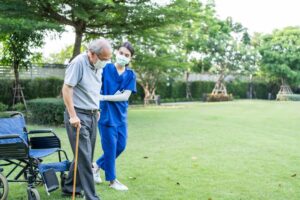
Recognizing signs of inadequate training in nursing homes is crucial for family members to ensure the safety and well-being of their loved ones. Poorly trained staff can lead to severe issues, including frequent falls and inconsistent care.
Indicators of inadequate training include frequent falls among residents, inconsistent care routines, and high staff turnover. Families should be alert to these signs as they often point to systemic issues within the facility. Testimonials from families who noticed these red flags can be compelling, illustrating the real impact of inadequate training.
Speak With a Nursing Home Injury Attorney
If you suspect inadequate training resulted in your loved one suffering a severe injury, please act immediately. Consulting with a nursing home abuse lawyer is essential in evaluating and addressing these concerns. An attorney can thoroughly investigate to build a strong case.
Your lawyer will handle all legal matters, from filing complaints to pursuing lawsuits. They’ll explore all legal avenues, maximizing the chances of securing compensation. Through diligent investigation and legal action, families can hold nursing homes accountable, driving improvements in care standards and ensuring justice for their loved ones.
An Experienced Nursing Home Injury Lawyer Can Help
As you can see, inadequate staff training and nursing home falls lead to devastating injuries and tragedies. If facility negligence harmed your family member, acting fast is critical.
Contact a personal injury lawyer immediately to protect your loved one’s rights and hold the responsible parties accountable. An experienced attorney will work to secure the maximum compensation for medical expenses, pain and suffering, and other related costs. Don’t let negligence go unchallenged – reach out to a dedicated nursing home abuse lawyer today to ensure justice and prevent further harm to your loved ones.
Nathan Hughey, an attorney and fourth-generation South Carolinian, founded Hughey Law Firm in 2007. Before that, he spent five years defending nursing homes and insurance companies. Leveraging his experience, he now advocates for those injured or wronged by such entities, securing over $290 million in verdicts and settlements.
